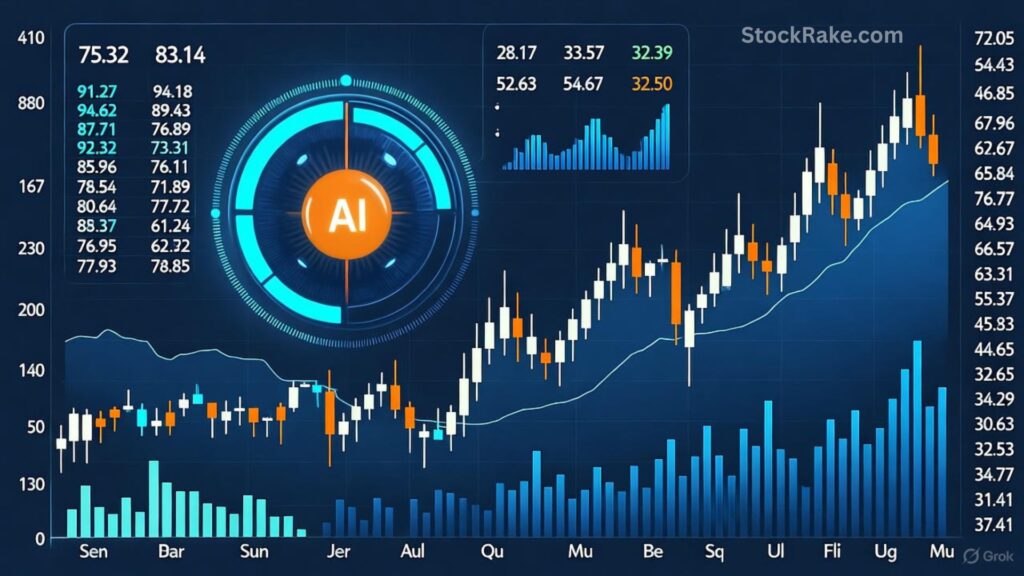Artificial intelligence (AI) isn’t just a buzzword anymore — it’s the foundation of the next technological revolution. From healthcare to finance, transportation to entertainment, AI is driving change at an unprecedented pace. And for investors, that means one thing: opportunity.
June 2025 marked a turning point for the AI industry. Governments finally began stepping in to regulate how AI is built and used — a move that could shape the future of innovation and investment alike.
- June 12, 2025 – New York introduced the Responsible AI Safety and Education (RAISE) Act, targeting companies that develop powerful AI systems. Its mission: prevent AI misuse, like developing weapons or causing mass harm.
- June 22, 2025 – Texas followed suit with the Responsible Artificial Intelligence Governance Act (TRAIGA), focusing on AI ethics and prohibiting discriminatory or violent applications.
These legislative steps signal that AI’s “wild west” phase may be ending — and the next phase of responsible, large-scale adoption is beginning. For long-term investors, that’s both a challenge and an opportunity.
Best AI Stocks to Watch in July 2025
If you’re looking to invest in AI this year, you’ll find dozens of companies claiming to lead the field. But not all AI stocks are created equal. Based on value, growth, and momentum, here are some of the top picks to keep on your radar.

(All data as of June 24, 2025)
💸 Best-Value AI Stocks
Value investors seek companies that trade below their intrinsic worth — often measured using the price-to-earnings (P/E) ratio. A low P/E can suggest a bargain, but only if the company’s fundamentals are solid.
Before jumping in, ask yourself:
- Why is the stock undervalued?
- Is the company improving its operations or profitability?
- Is there a clear path to market recognition?
| Company | Price ($) | Market Cap ($B) | P/E Ratio |
|---|---|---|---|
| Yiren Digital (YRD) | 6.07 | 0.5 | 2.9 |
| i3 Verticals (IIIV) | 25.58 | 0.8 | 5.5 |
| Baidu (BIDU) | 86.68 | 29.6 | 8.6 |
Yiren Digital (YRD)
Based in China, Yiren Digital offers financial and lifestyle services powered by advanced AI. The company uses AI for fraud detection, customer onboarding, and debt management — crucial in China’s fast-evolving fintech space. With a tiny P/E ratio under 3, Yiren looks like a hidden gem for patient investors.
i3 Verticals (IIIV)
This U.S.-based firm builds specialized software for government and healthcare sectors. Its AI integrations enhance efficiency and client communication. i3 Verticals focuses on stable, recurring revenue streams — a quality that’s often undervalued in today’s tech-driven market.
Baidu (BIDU)
Often called “the Google of China,” Baidu has quietly transformed into a serious AI powerhouse. Beyond search, its AI powers cloud computing, autonomous driving, and robotaxis through Apollo Go, the largest self-driving taxi service in China. For investors seeking global AI exposure, Baidu remains a strong contender.
Pro Tip: Want to avoid “value traps”? Look for companies improving margins or gaining market share, not just those with low ratios.
Read more on Investopedia: Value Investing Principles.

Also Read: Should You Reinvest Dividends or Take the Cash?
🚀 Fastest-Growing AI Stocks

Growth investors chase expansion — companies increasing revenue and earnings at breakneck speed. In 2025, a few mid-cap AI companies are showing exceptional results without the overhype of mega-cap names like Nvidia or Microsoft.
| Company | Price ($) | Market Cap ($B) | EPS Growth (%) | Revenue Growth (%) |
|---|---|---|---|---|
| Innodata (INOD) | 46.60 | 1.5 | 626% | 120% |
| Clearwater Analytics (CWAN) | 22.35 | 6.3 | 255% | 24% |
| EverQuote (EVER) | 24.07 | 0.9 | 291% | 25% |
Innodata (INOD)
Innodata supplies the “fuel” that large AI models need: clean, reliable data. With over 6,000 experts and its Goldengate AI platform, the company helps refine large language models (LLMs) used by top tech firms. Its triple-digit growth reflects soaring demand for high-quality AI training data.
Clearwater Analytics (CWAN)
Managing more than $8.8 trillion in assets daily, Clearwater’s cloud-based platform helps insurers and financial giants track investments efficiently. Its AI automates reporting, risk analysis, and compliance — a space traditionally dominated by legacy software. Steady growth and enterprise adoption make CWAN a strong long-term play.
EverQuote (EVER)
EverQuote is revolutionizing online insurance shopping. Its AI algorithms match consumers with the best-fitting policies, cutting costs for insurers while improving conversion rates. With AI-driven fraud detection and predictive analytics, EverQuote’s scalable model is built for expansion.
📈 AI Stocks With the Most Momentum
Momentum investors focus on companies already moving upward — the idea being that “strength begets strength.” In the fast-paced AI sector, these are the stocks currently lighting up investor interest.
| Company | Price ($) | Market Cap ($B) | 12-Month Return (%) |
|---|---|---|---|
| Quantum Computing (QUBT) | 17.52 | 2.5 | 2,757% |
| TSS, Inc. (TSSI) | 28.87 | 0.7 | 1,281% |
| Diginex Limited (DGNX) | 46.56 | 1.1 | 993% |
Quantum Computing, Inc. (QUBT)
QUBT is merging AI and quantum physics — developing hybrid hardware that uses both light and electricity for processing. This next-generation computing approach could outperform traditional chips in speed and energy efficiency.
TSS, Inc. (TSSI)
TSS provides infrastructure for data centers — the beating heart of AI computing. After landing major contracts for AI server racks, it’s expanding production by $30 million. As AI demand skyrockets, TSS sits at the center of the hardware supply chain.
Diginex Limited (DGNX)
A UK-based innovator blending AI, blockchain, and ESG reporting, Diginex helps corporations meet sustainability goals through smarter data analytics. Its $2 billion acquisition of Resulticks, an AI-powered marketing platform, shows serious expansion intent.
👍 Why Invest in AI Stocks?

The AI sector offers one of the most transformative investment opportunities of the decade. Here’s why:
- Massive Market Potential – From self-driving cars to AI healthcare diagnostics, industries worth trillions are being reshaped. According to PwC, AI could contribute over $15.7 trillion to the global economy by 2030.
- Continuous Innovation – AI enhances productivity, automates workflows, and reduces costs. Companies mastering these efficiencies gain sustainable advantages.
- Investor Excitement and Growth – With media coverage and retail enthusiasm fueling demand, many AI stocks have seen explosive growth — and the trend isn’t slowing.

Also Read: What’s the Difference Between Growth and Value Stocks?
⚠️ But There Are Risks Too
No investment is without risk, and AI stocks carry their share of volatility and uncertainty.
- High Valuations – Many AI firms trade on potential, not current profits. If results fall short, prices can tumble fast.
- Regulatory Pressure – Laws like RAISE and TRAIGA are only the beginning. Future rules on data use, labor impact, and ethics could slow development or increase costs.
- Intense Competition – Titans like Google, Microsoft, Nvidia, and OpenAI dominate the field. Smaller startups face a tough climb — even as new players like DeepSeek and Anthropic push boundaries.
Investor Insight: Consider diversification. Mix established AI leaders with promising small caps to balance growth and stability.
Learn more from Forbes: How to Invest in AI Stocks.
💡 Expert Tips for AI Investors
- Follow Earnings, Not Hype – Look for revenue and profit growth, not just flashy announcements.
- Study Real-World Use Cases – Companies using AI in practical, scalable ways often outperform those chasing theoretical potential.
- Track Regulation Trends – Early awareness of legal changes can help you adjust your portfolio before the crowd.
- Watch Hardware & Infrastructure – The AI boom depends heavily on chips, data centers, and cloud services — not just software.
- Rebalance Regularly – AI stocks can be volatile. Trim profits during surges and reinvest in underappreciated sectors.
Case Study: Baidu’s Robotaxi Expansion
Baidu’s Apollo Go service offers a glimpse into AI’s real-world disruption. The company operates thousands of autonomous vehicles in Chinese cities, logging millions of safe rides. This isn’t just an experiment — it’s a scalable business model combining AI, sensors, and cloud connectivity. Investors betting early on Baidu’s shift from search to smart mobility have already seen promising returns.

Also Read: Can You Really Make Money with Penny Stocks?
Final Thoughts: Investing Wisely in the AI Revolution
AI is changing the way the world works — and how investors build wealth. From high-value data companies like Innodata to innovators like Baidu and Quantum Computing, the sector offers endless opportunities for those willing to look beyond the headlines.
Still, success requires balance. Understand the risks, stay informed about regulation, and think long-term. Whether you’re a value seeker, a growth chaser, or a momentum investor, the future of AI has a place for your strategy — if you play it smart.
FAQs About AI Stocks
Q1. Are AI stocks overvalued right now?
Some are — especially those driven by hype rather than earnings. Always check fundamentals like revenue growth and cash flow before investing.
Q2. What’s the safest way to invest in AI?
Consider diversified exposure through ETFs like Global X Robotics & Artificial Intelligence ETF (BOTZ) or iShares Robotics and AI Multisector ETF (IRBO).
Q3. How long should I hold AI stocks?
AI is a long-term play. Hold for 3–5 years or longer to ride out volatility and capture true growth potential.
Q4. Can small AI companies compete with tech giants?
Yes — especially in niche areas like data labeling, cybersecurity, or AI infrastructure. Innovation often starts small.
Q5. How do regulations affect AI companies?
Laws ensuring ethical use can limit short-term profits but may strengthen public trust — vital for long-term sustainability.

